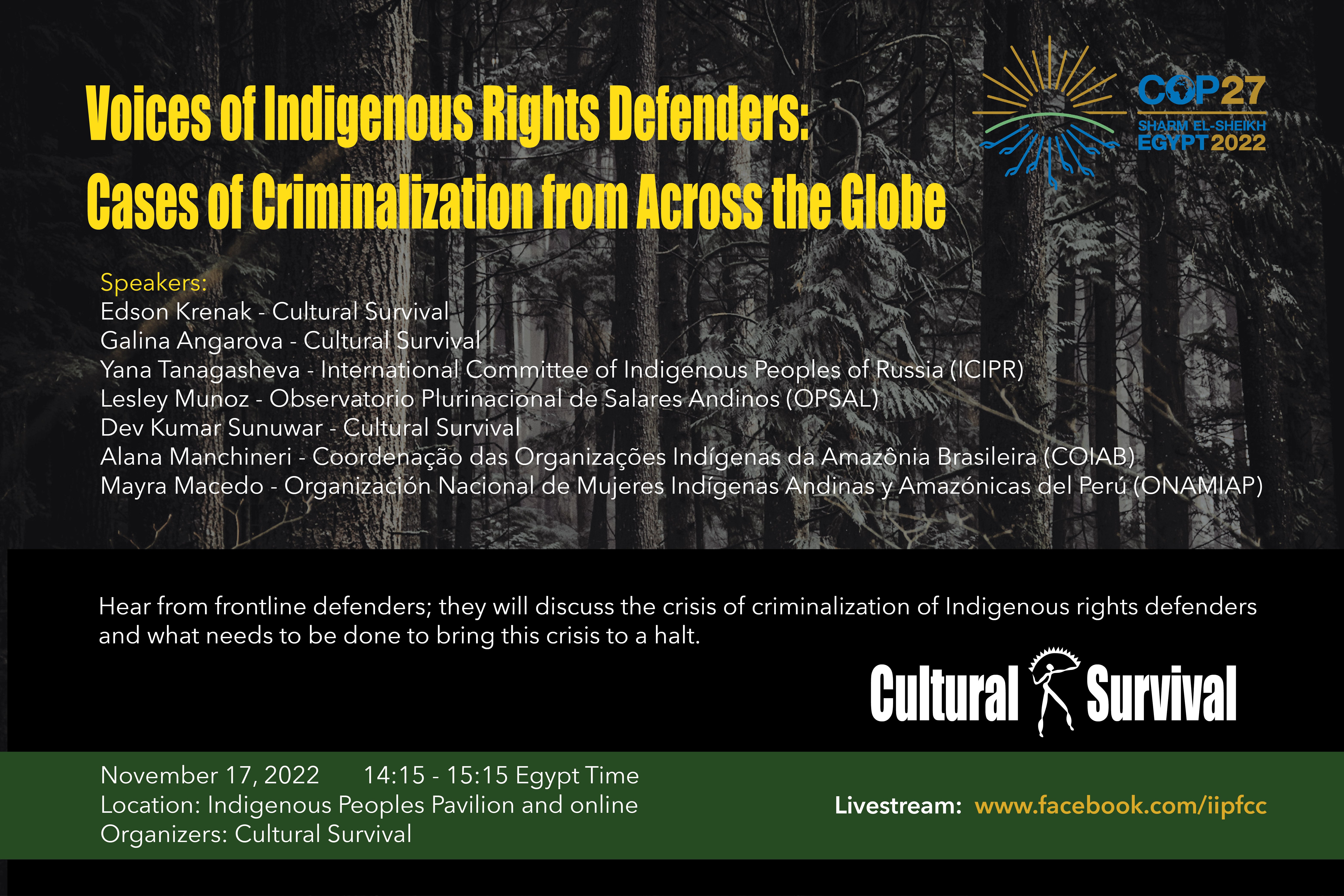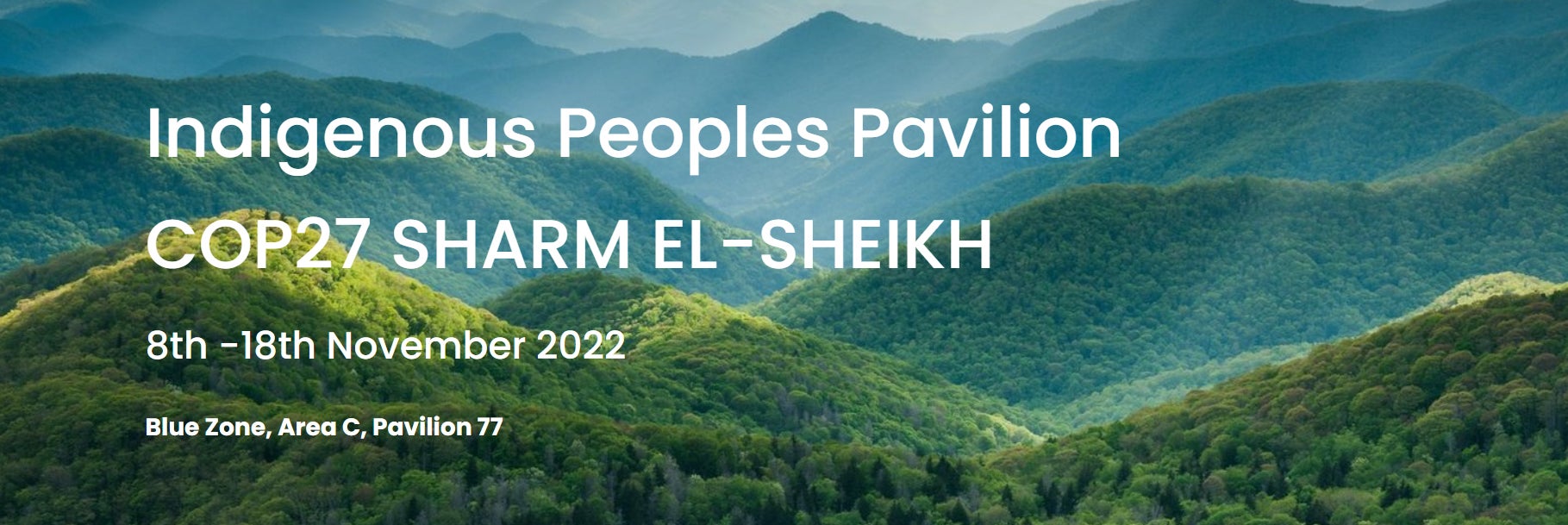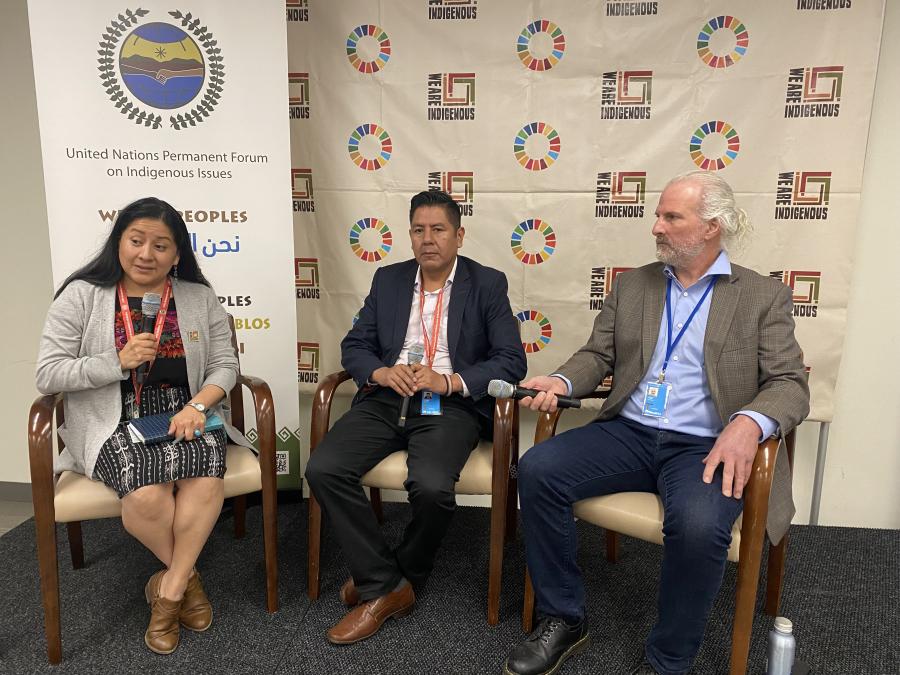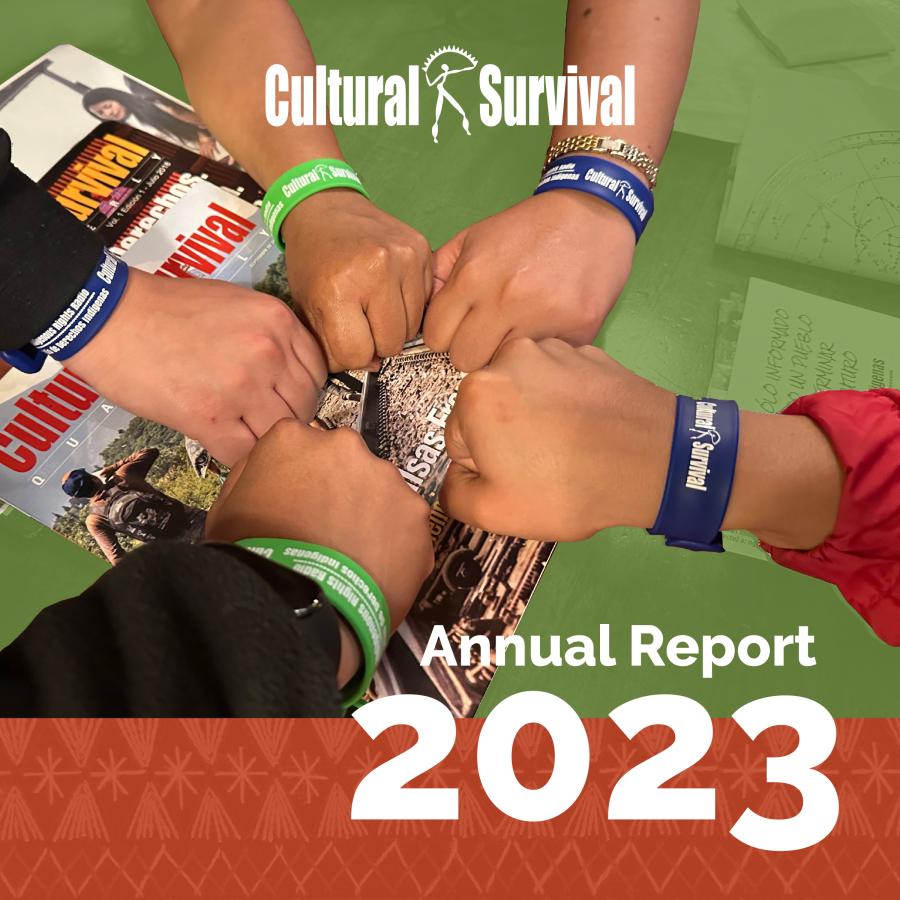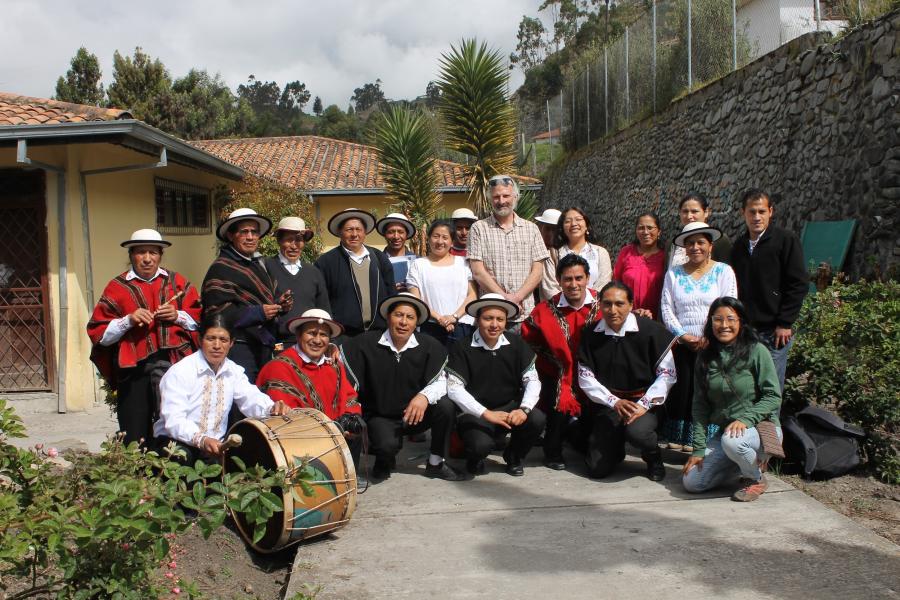
From November 6 to November 18, 2022, the United Nations Framework Convention on Climate Change (UNFCCC) Conference of Parties (COP 27) is happening in Sharm El Sheikh, Egypt. Indigenous representation is essential in moving world leaders to take immediate action on climate change, and that is why members of our team will be attending to join the Indigenous Peoples' Caucus and other Indigenous and allied leaders in pushing policymakers for urgent and holistic responses to climate chaos. Proactive efforts to center, resource, and respect Indigenous rights, leadership, and stewardship must be prioritized in all layers of decision-making as we collectively engage to combat climate change.
Cultural Survival's in-person delegation includes Dev Kumar Sunuwar (Koĩts-Sunuwar), Community Media Program Coordinator; Shaldon Ferris (Khoisan), Indigenous Rights Radio Coordinator; Bryan Bixcul (Maya Tz'utujil), Executive Coordinator; Edson Krenak Naknnanuk (Krenak), Lead on Brazil; Polina Shulbaeva (Selkup), Consultant; and Lesley Muñoz Rivera (Colla), Observatorio Plurinacional de Salares Andinos (OPSAL) Chile.
Follow us on Facebook, Twitter, and Instagram as we report on key actions and takeaways from COP 27.
Read Our Organizational COP 27 Statement Lea nuestra declaración organizativa de la COP 27 
Statement towards Discontinuing the Use of the Collective Term “Indigenous Peoples and Local Communities” or “IPLC”
Cultural Survival and First Peoples Worldwide consider it necessary to address a growing international position that combines and equates Indigenous Peoples–and in particular, their affirmed rights to lands and territories and Free, Prior and Informed Consent (FPIC)–with local communities within the term “Indigenous Peoples and Local Communities” or “IPLC.” The combination of these two different entities disregards the collective rights to which Indigenous Peoples are entitled as distinct, self-determining Peoples. Read more. En español.
How Indigenous Peoples Are Adapting to and Mitigating the Impacts of Climate Change
Frontline Indigenous Communities Address Climate Change
Although Indigenous communities do not always use academic language to discuss climate change, many communities’ livelihoods are defined by the close relationships with their surroundings, environmental awareness, and understanding of the ecological and weather-related patterns of their territories. Read more. En español
COP 27 - Gunn-Britt Retter on Green Colonialism
In the transition to the so-called green economy, Indigenous Peoples are facing a new wave of extractivism for transition minerals. We spoke to Gunn-Britt Retter (Saami) from the Saami Council.
 COP 27 - Eileen Mairena Cunningham on The Impact Of Climate Change in Nicaragua
COP 27 - Eileen Mairena Cunningham on The Impact Of Climate Change in Nicaragua
A Just Transition for Indigenous Peoples is one that centers a human rights approach and the protection of biodiversity and advances Indigenous sovereignty and self-determination in all endeavors relating to the building of green economies. Cultural Survival spoke to Eileen Mairena Cunningham (Miskitu) from CADPI.

COP 27 - Andrea Carmen On Indigenous Peoples and Climate Change
Indigenous Peoples are not just stakeholders; Indigenous Peoples are rights holders. Cultural Survival reiterates the importance of Indigenous Peoples’ access to direct participation at the same negotiation tables as nation states at the UNFCCC COP27, with the right to have a voice and vote, and the inclusion of references to human and Indigenous Peoples’ rights in all documents. Cultural Survival spoke to Andrea Carmen (Yaqui) of the International Indian Treaty Council about Indigenous Peoples and climate change action.
Cultural Survival's Events at COP27
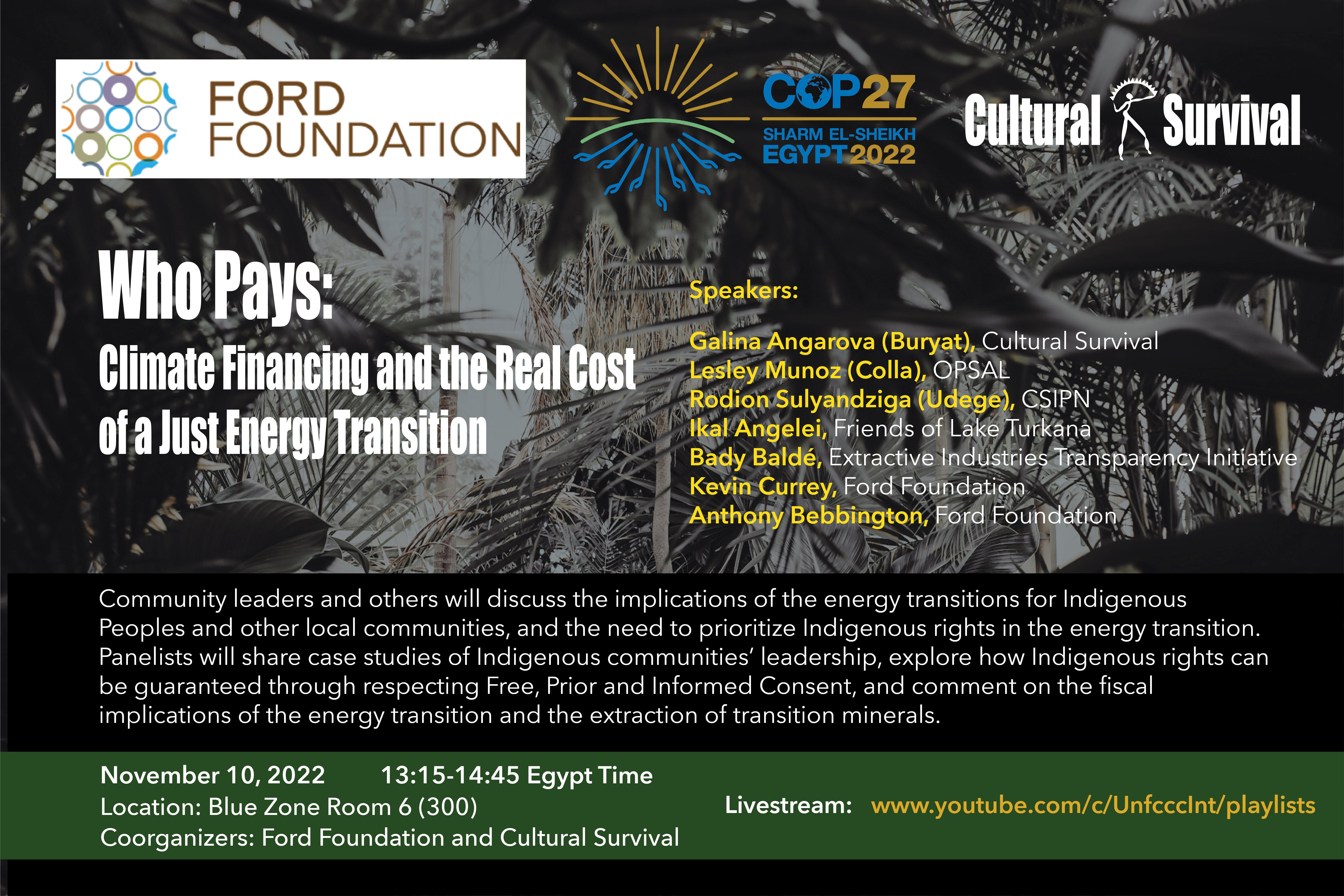
November 10, 2022 13:15-14:45 Egypt Time
Who Pays: Climate Financing and the Real Cost of a Just Energy Transition
Indigenous Peoples are facing a new wave of extractivism for transition minerals such as copper, nickel, cobalt, lithium, and other metals that are key in battery development for e-mobility and energy storage, as well as in the building of wind and solar technologies and new transmission networks. These projects are promoted as “green”, however, such mining projects risk replicating the same harms of the fossil fuel economy: threatening Indigenous Peoples’ rights and territories and destroying biodiverse ecosystems. At this session, community leaders and others will discuss the implications of the energy transitions for Indigenous Peoples and other local communities, and the need to prioritize Indigenous rights in the energy transition. Panelists will share case studies of Indigenous communities’ leadership, explore how Indigenous rights can be guaranteed through respecting Free, Prior and Informed Consent, and comment on the fiscal implications of the energy transition and the extraction of transition minerals. Reflecting on these financial dimensions, panelists will explore community based perspectives on the costs and benefits of transition to a green economy and the broader implications for climate finance.
Location: Blue Zone Room 6 (300)
Coorganizers: Ford Foundation and Cultural Survival
Livestream: https://www.youtube.com/watch?v=IRADWN16IbM
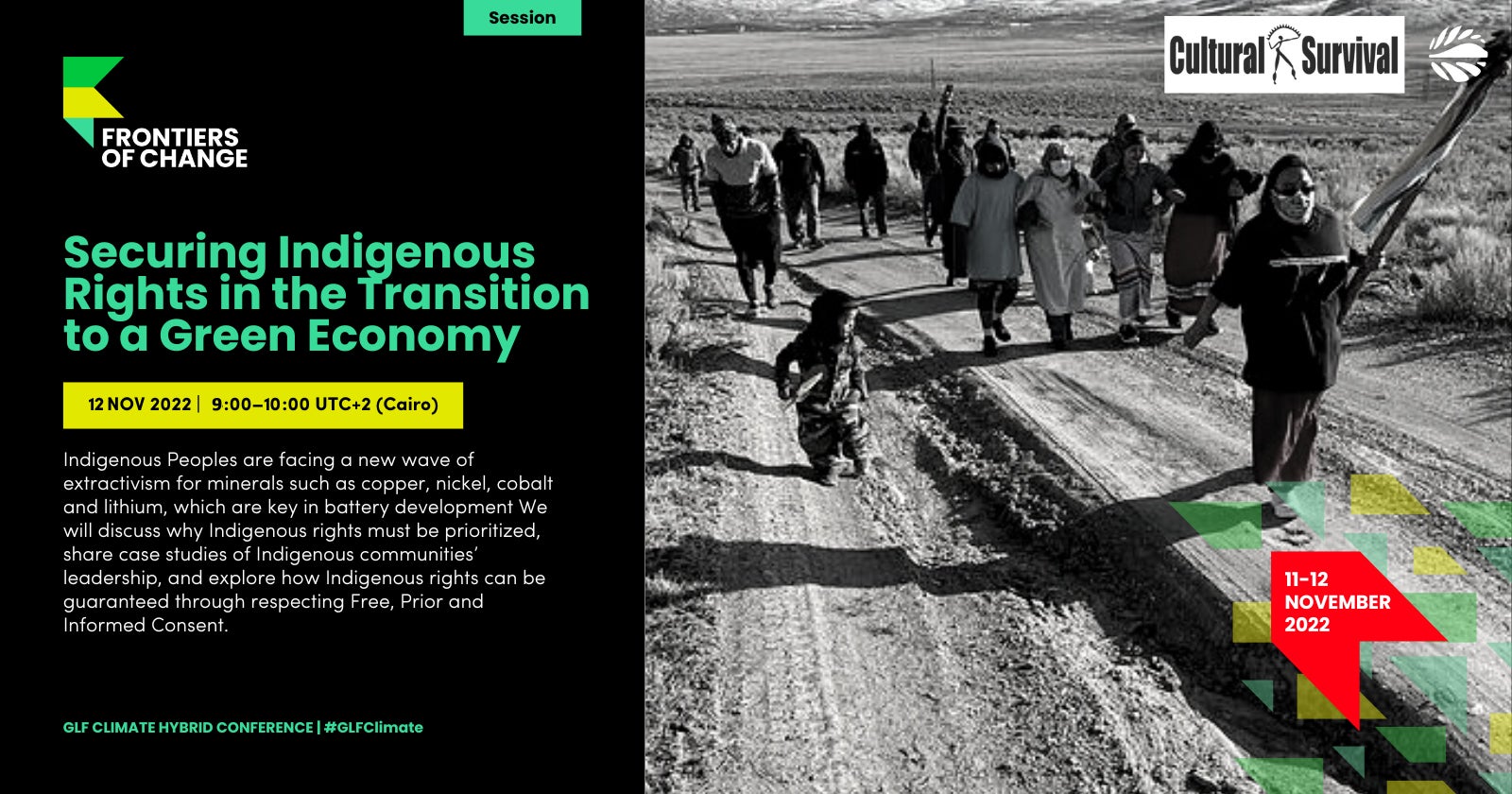
November 12, 2022 9:00 am Egypt Time
Securing Indigenous Rights in the Transition to a Green Economy
Indigenous Peoples are facing a new wave of extractivism for transition minerals such as copper, nickel, cobalt and lithium, which are key in battery development. These projects are promoted as “green” because they aim to supply minerals used in renewable energy and electric vehicles. However, these mining projects risk replicating the same harms of the fossil fuel economy: threatening Indigenous Peoples’ rights and territories and destroying biodiverse ecosystems. At this session, we will discuss why Indigenous rights must be prioritized, share case studies of Indigenous communities’ leadership, and explore how Indigenous rights can be guaranteed through respecting Free, Prior and Informed Consent.
Asegurando los derechos Indígenas en la transición hacia una economía verde
Coorganizers: Global Landscape Forum (GLF) and Cultural Survival
Event link
Register to watch.
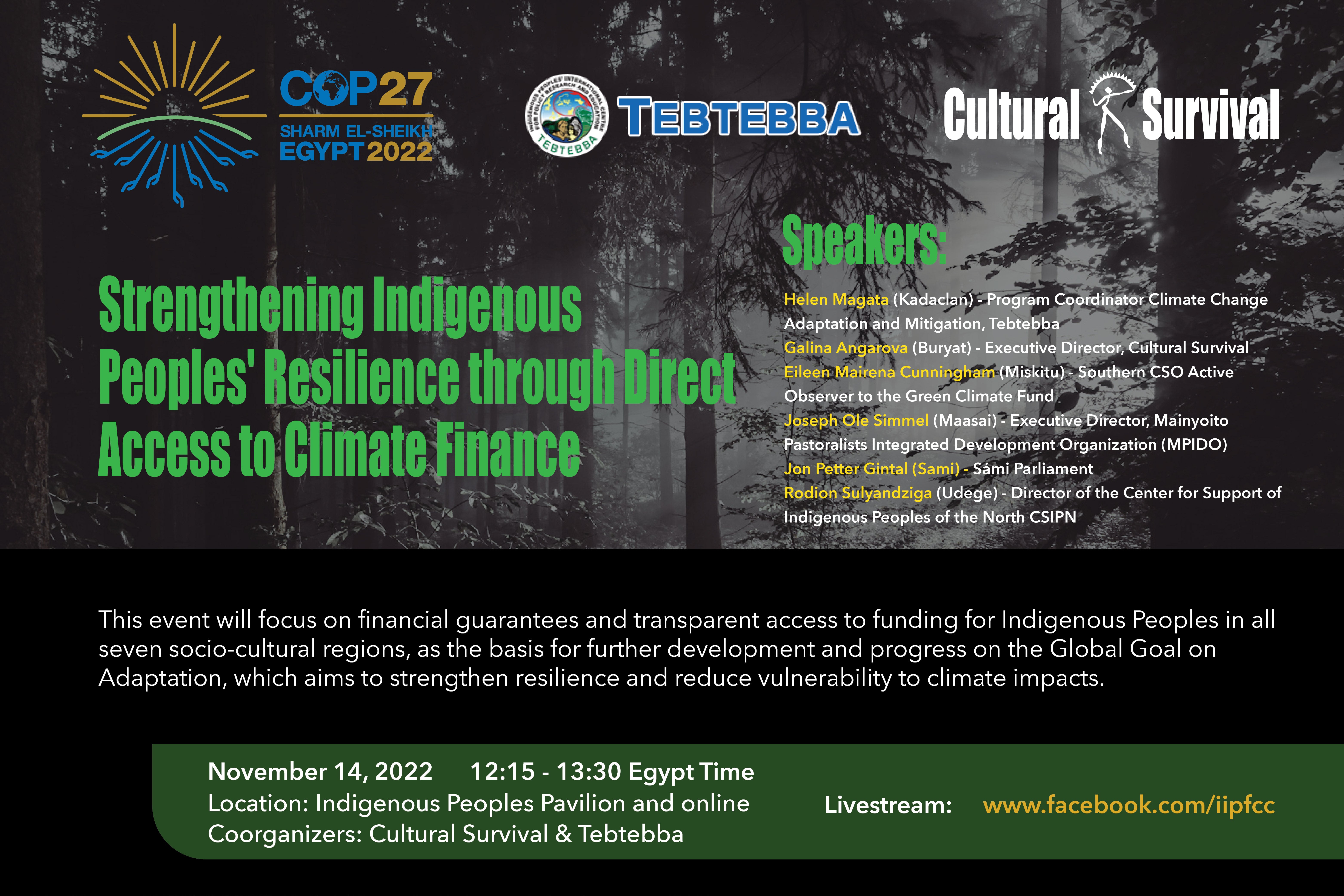
November 14, 2022 12:15 - 13:30 Egypt Time
Strengthening Indigenous Peoples' Resilience through Direct Access to Climate Finance
As part of the negotiations at COP27, Parties will consider clear financial targets for Mitigation, Adaptation, and financing for Loss and Damage. Indigenous Peoples and local communities note that an equivalent to less than 1% of Overseas Development Assistance for climate adaptation and mitigation is allocated to support Indigenous Peoples' tenure and forest management from 2011-2020. Meanwhile, there is no literature to show aggregates on much climate finance Indigenous Peoples are receiving to support their other climate initiatives. Indigenous Peoples note the need for direct access to finance and transparency in its distribution. There is also a need to recognize the equal need of Indigenous peoples in the global north for climate finance to support their climate mitigation and adaptation needs, including losses and damages. Our Side Event will focus on financial guarantees and transparent access to funding for Indigenous Peoples in all seven socio-cultural regions, as the basis for further development and progress on the Global Goal on Adaptation (GGA), which aims to strengthen resilience and reduce vulnerability to climate impacts.
Speakers:
Helen Magata (Kadaclan) - Program Coordinator Climate Change Adaptation and Mitigation, Tebtebba
Galina Angarova (Buryat) - Executive Director, Cultural Survival
Eileen Mairena Cunningham (Miskitu) - Southern CSO Active Observer to the Green Climate Fund
Joseph Ole Simmel (Maasai)- Executive Director, Mainyoito Pastoralists Integrated Development Organization (MPIDO)
Jon Petter Gintal (Sami) - Sámi Parliament
Rodion Sulyandziga (Udege) - Director of the Center for Support of Indigenous Peoples of the North CSIPN
Location: Indigenous Peoples Pavilion and online
Coorganizers: Cultural Survival & Tebtebba
Link to view.
November 17, 2022 14:15 - 15:15 Egypt Time
Voices of Indigenous Rights Defenders: Cases of Criminalization from Across the Globe
Frontline Defenders reported that at least 331 human rights defenders were killed in 2020, 69 percent of whom were specifically defending Indigenous land or environmental rights and 26 percent of whom focused on Indigenous Peoples’ rights in particular. In the three years prior to October 2020, over 25 percent of rights defenders who were killed were Indigenous, despite representing just 6 percent of the global population. At this session we will hear from frontline defenders; they will discuss the crisis of criminalization of Indigenous rights defenders and what needs to be done to bring this crisis to a halt.
Speakers:
Edson Krenak - Cultural Survival
Galina Angarova - Cultural Survival
Yana Tanagasheva - International Committee of Indigenous Peoples of Russia (ICIPR)
Lesley Munoz - Observatorio Plurinacional de Salares Andinos (OPSAL)
Dev Kumar Sunuwar - Cultural Survival
Alana Manchineri - Coordenação das Organizações Indígenas da Amazônia Brasileira (COIAB)
Mayra Macedo - Organización Nacional de Mujeres Indígenas Andinas y Amazónicas del Perú (ONAMIAP)
Location: Indigenous Peoples Pavilion and online
Organizers: Cultural Survival
Link to view.
Cultural Survival staff will also be participating in other expert panels. Here is our itinerary of events (among others we will share soon):

November 11, 2022 18:30 - 19:30 Egypt Time
GLF Frontiers of Change Stewardship Economy Plenary
Join Galina Angarova (Buryat), our Executive Director, at GLF Climate 2022 - Stewardship Economy Plenary, where she will share about the need to center Indigenous Peoples' and human rights as well as true, regenerative practices as we transition to a green economy. Healthy and sustainable economies should mirror healthy ecological systems. Healthy ecosystems are interconnected and resilient to change; they are interdependent and regenerate each other, rather than depleting and weakening the system. A stewardship economy is one that brings ‘stewardship’ – land use practices and processes that foster the sustainable use and management of natural resources – to the heart of markets, governments, and nonprofit decision making and practices.
Location: Savoy Hotel Sharm El Sheikh and online
Register to watch.
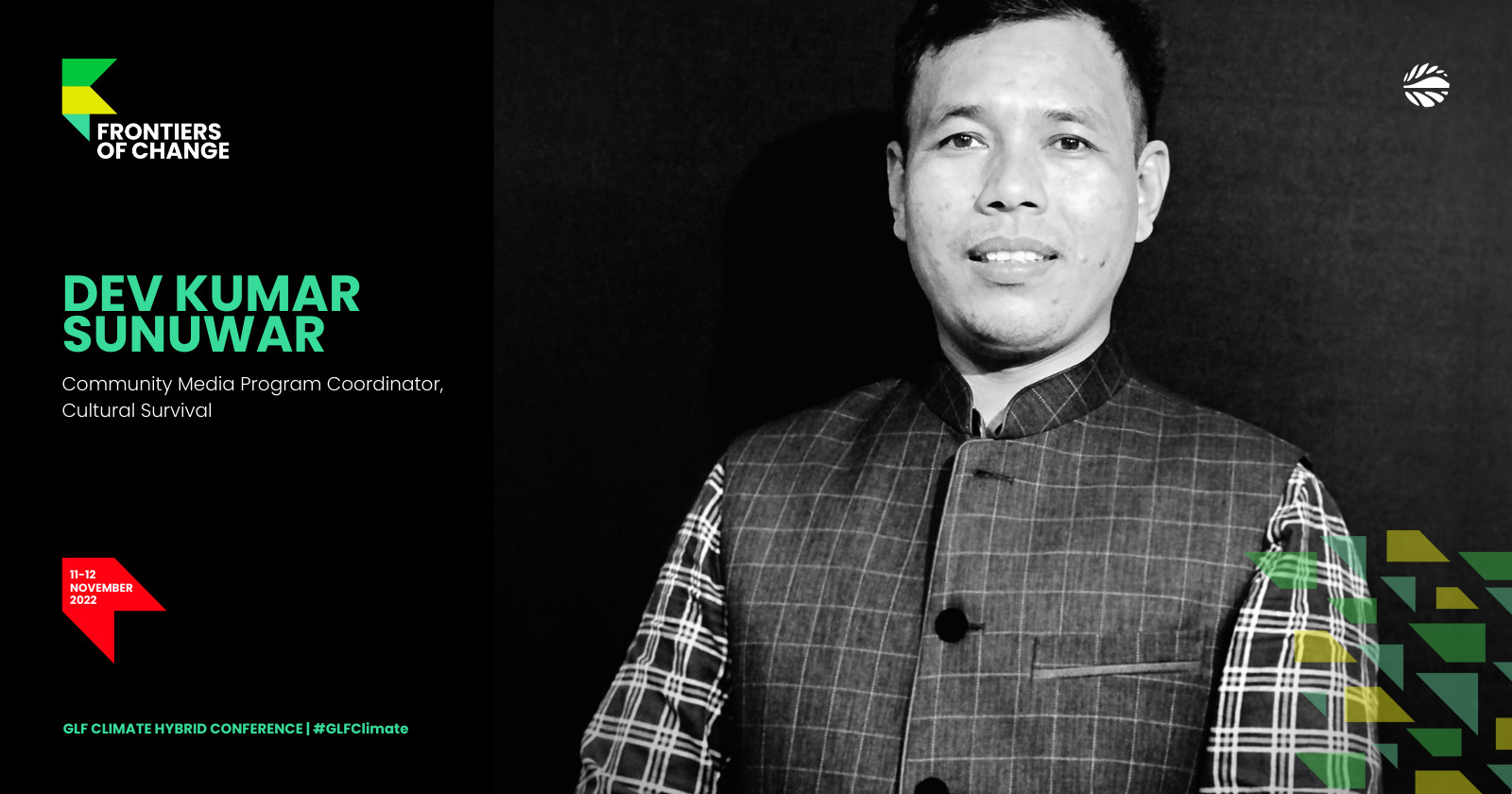
November 12, 2022 18:30 - 19:30 Egypt Time
GLF Frontiers of Change Closing Plenary
Dev Kumar Sunuwar (Koĩts-Sunuwar), Cultural Survival Community Media Program Coordinator, will participate at GLF Climate 2022 - Closing Plenary, where he will share about how we can ensure development pathways create value for Indigenous and local people based on low-carbon economies. The world of tomorrow will be defined by the decisions and actions of today. Join policy-makers, youth, producers, activists, Indigenous Peoples, and the business community in accelerating a just transition that puts people and nature on a path to recovery. Landscapes offer crucial opportunities for rebalancing the climate system by both removing carbon from the atmosphere and lowering emissions from land use. This plenary aims to inspire collective action, behavioral changes, nature and land-based solutions, political will, and incentives that offer hope for a decarbonized future. The time is now.
Location: The Egypt Hall and online
Register to watch.
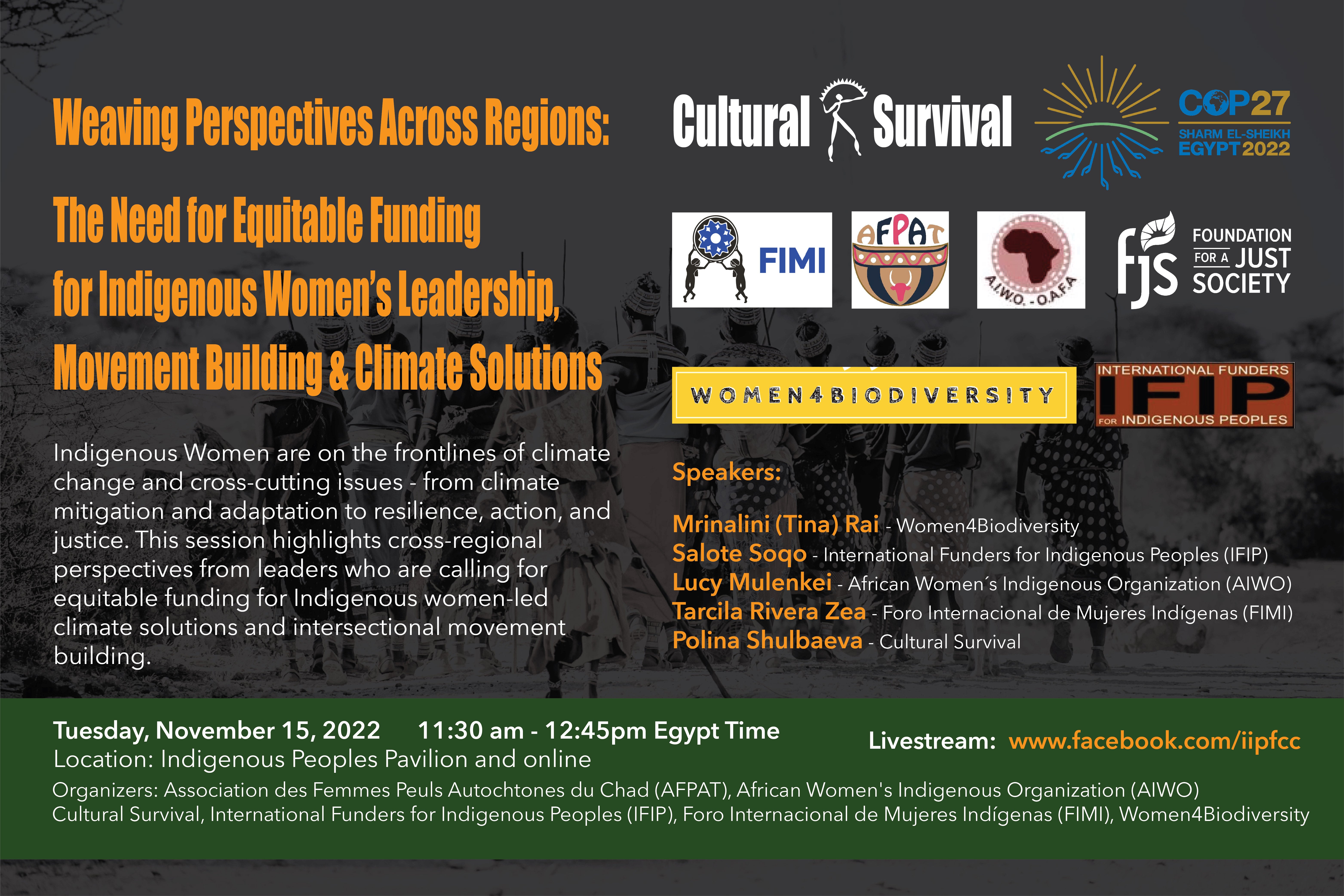
Tuesday, November 15, 2022 11:30 am - 12:45pm Egypt
Weaving Perspectives Across Regions: The Need for Equitable Funding for Indigenous Women’s Leadership, Movement Building & Climate Solutions
Indigenous Women are on the frontlines of climate change and cross-cutting issues - from climate mitigation and adaptation to resilience, action, and justice. Indigenous Women are protecting natural resources, resisting extractive industries, protecting land and territory rights, upholding ancestral knowledge, and organizing by centering the rights, needs, voices of Indigenous Women, Girls, LGBTQ2+ Peoples. Yet, resourcing for Indigenous Women’s movement building is minimal, access to spaces that center Indigenous Women’s participation is limited, and climate financing is not reaching grassroots groups let alone Indigenous Women. This session highlights cross-regional perspectives from leaders who are calling for equitable funding to Indigenous women-led climate solutions and intersectional movement building.
Speakers:
Mrinalini (Tina) Rai - Women4Biodiversity
Salote Soqo - International Funders for Indigenous Peoples - (IFIP)
Lucy Mulenkei - African Women's Indigenous Organization (AIWO)
Tarcila Rivera Zea - Foro Internacional de Mujeres Indigenas (FIMI)
Polina Shulbaeva - Cultural Survival
Organizers: Association des Femmes Peuls Autochtones du Chad (AFPAT), Cultural Survival, International Funders for Indigenous Peoples (IFIP), Foro Internacional de Mujeres Indígenas (FIMI), African Women's Indigenous Organization (AIWO), Women4Biodiversity
Location: Indigenous Peoples Pavilion and online
Link to view.


